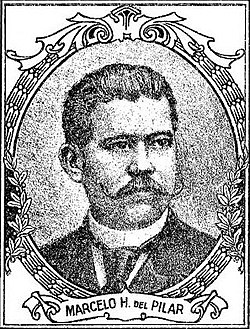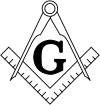Marcelo H. del Pilar: Difference between revisions
unsourced section Tag: section blanking |
MangoDango (talk | contribs) Undid revision 549935232 by 125.212.125.244 (talk) |
||
| Line 49: | Line 49: | ||
==Freemasonry== |
==Freemasonry== |
||
Del Pilar was initiated into [[Freemasonry]] in 1889.<ref>{{cite web|url=http://www.glphils.org/famous-masons/fmhdelpilar.htm |title=Famous Filipino Mason - Marcelo H. Del Pilar |publisher=Most Worshipful Grand Lodge of the Philippines|date= |accessdate=2010-01-12}}</ref> He was instrumental in establishing Filipino Masonry in the country and the approval by the ''[[Grande Oriente Español]]''<ref>{{cite web|url=http://www.gle.org/ingles/i_historia.php#III 1863-1923|title=Brief History of the Spanish Masonry|date=|publisher=|accessdate=October 23, 2011|format=}}</ref> of the first national organization of Filipino Masons, the ''Gran Consejo Regional de Filipinas'' in 1893. For all his efforts, he is considered as the "''Father of Philippine Masonry."''[[File:statue-marcelo-h-del-pilar.jpg|thumb|120px|alt=Marcelo H. Del Pilar|The National Shrine of Marcelo H. del Pilar in San Nicolas, [[Bulacan, Bulacan]]]] |
Del Pilar was initiated into [[Freemasonry]] in 1889.<ref>{{cite web|url=http://www.glphils.org/famous-masons/fmhdelpilar.htm |title=Famous Filipino Mason - Marcelo H. Del Pilar |publisher=Most Worshipful Grand Lodge of the Philippines|date= |accessdate=2010-01-12}}</ref> He was instrumental in establishing Filipino Masonry in the country and the approval by the ''[[Grande Oriente Español]]''<ref>{{cite web|url=http://www.gle.org/ingles/i_historia.php#III 1863-1923|title=Brief History of the Spanish Masonry|date=|publisher=|accessdate=October 23, 2011|format=}}</ref> of the first national organization of Filipino Masons, the ''Gran Consejo Regional de Filipinas'' in 1893. For all his efforts, he is considered as the "''Father of Philippine Masonry."''[[File:statue-marcelo-h-del-pilar.jpg|thumb|120px|alt=Marcelo H. Del Pilar|The National Shrine of Marcelo H. del Pilar in San Nicolas, [[Bulacan, Bulacan]]]] |
||
==Legacy== |
|||
Organized in his memory, the ''Samahang Plaridel'' is a fellowship of journalists and other communicators that aims to propagate Marcelo H. del Pilar’s ideals. This fellowship fosters within its capacity, mutual help, cooperation, and assistance among its members; dedicated to the journalistic standards of accuracy and truth, and in promoting these standards in the practice of [[journalism]]. |
|||
Plaridel is the chosen patron saint of today’s journalists, as his life and works prized freedom of thought and opinion most highly, loving independence above any material gain. Plaridel’s ideology of truth, fairness and impartiality is anchored on democratic principles, as these are the bastions of a society acceptable to all Filipinos. |
|||
The building that houses the [[Polytechnic University of the Philippines|Polytechnic University of the Philippines Graduate School]] is named after him.<ref name="Campus">{{cite web |url=http://www.pup.edu.ph/Profile/campuses.asp |title=Campuses |publisher=Polytechnic University of the Philippines |accessdate=April 7, 2013}}</ref> |
|||
==Notable works== |
==Notable works== |
||
Revision as of 01:15, 12 April 2013
Marcelo H. del Pilar | |
|---|---|
 | |
| Born | Marcelo Hilario del Pilar y Gatmaitán August 30, 1850 |
| Died | July 4, 1896 (aged 45) |
| Cause of death | Tuberculosis |
| Nationality | Filipino |
| Alma mater | Colegio de San José Universidad de Santo Tomás |
| Occupation(s) | Writer, lawyer, journalist |
| Organization | La Solidaridad |
| Spouse | Marciana "Chanay" del Pilar |
| Children | Sofía H. del Pilar Anita H. del Pilar de Marasigan |
Marcelo Hilario del Pilar y Gatmaitán (August 30, 1850 – July 4, 1896), better known by his pen name Plaridel, was a Filipino writer, lawyer, and journalist.[1] He was the second and last editor of the La Solidaridad (The Solidarity).[2][3]
Biography
Marcelo H. del Pilar was born on August 30, 1850 in the barrio of Cupang, municipality of San Nicolás, province of Bulacan.[4] His parents were Julián H. del Pilar and Blasa Gatmaitán. Del Pilar was the ninth child of their ten children namely: Toribio (priest, deported to the Marianas in 1872),[5] Fernando (father of General Gregorio del Pilar),[6] Andrea, Dorotea, Estanislao, Juan, Hilaria (married to Deodato Arellano), Valentín, Marcelo, and María.
The real surname of the family was "Hilario". They adapted the surname "del Pilar" in accordance with the decree issued by Governor-General Narciso Clavería.
As a young boy del Pilar learned how to play the flute, piano, and violin. He studied first in the college owned by Hermenigildo Flores, then at the Colegio de San José,[4] from where he transferred to the Universidad de Santo Tomás. He earned his licenciado en jurisprudencia (equivalent to a Bachelor of Laws) in 1880.[7]
On August 1, 1882, del Pilar co-founded the Diariong Tagalog (Tagalog Newspaper), the first Philippine bilingual newspaper.[5] He organized anti-friar demonstrations, culminating in a petition signed by eight hundred people for the expulsion of friars in the Philippines and exile of the Archbishop.[8]
On October 28, 1888, fleeing from clerical persecution, del Pilar went to Spain, leaving his wife and two daughters behind.[9]

On December 15, 1889, del Pilar replaced Graciano López Jaena as editor of the La Solidaridad.[2] Under his editorship, the aims of the newspaper expanded. Using propaganda, it pursued the desires for:[10][11]
- Cultural assimilation
- Removal of the friars and the secularization of the parishes
- Freedom of assembly and speech
- Equality before the law
- Philippine representation in the Cortes, the legislature of Spain
The publication of La Solidaridad stopped due to lack of funding. Del Pilar realized that only through revolution will change be instituted in the Philippines.
Del Pilar experienced hardships in Spain for lack of money. He got very sick and on July 4, 1896, he died at the Hospital de la Cruz and was buried at the Cementerio del Sub-Oeste in Barcelona.[12] His remains were returned to the Philippines on December 3, 1920 and was buried initially at the Manila North Cemetery. It was later transferred to his birthplace in Bulacán, Bulacan on August 30, 1986, under a monument.

Freemasonry
Del Pilar was initiated into Freemasonry in 1889.[13] He was instrumental in establishing Filipino Masonry in the country and the approval by the Grande Oriente Español[14] of the first national organization of Filipino Masons, the Gran Consejo Regional de Filipinas in 1893. For all his efforts, he is considered as the "Father of Philippine Masonry."

Legacy
Organized in his memory, the Samahang Plaridel is a fellowship of journalists and other communicators that aims to propagate Marcelo H. del Pilar’s ideals. This fellowship fosters within its capacity, mutual help, cooperation, and assistance among its members; dedicated to the journalistic standards of accuracy and truth, and in promoting these standards in the practice of journalism.
Plaridel is the chosen patron saint of today’s journalists, as his life and works prized freedom of thought and opinion most highly, loving independence above any material gain. Plaridel’s ideology of truth, fairness and impartiality is anchored on democratic principles, as these are the bastions of a society acceptable to all Filipinos.
The building that houses the Polytechnic University of the Philippines Graduate School is named after him.[15]
Notable works

- Ang Pagibig sa Tinubúang Lupà (Love of Country, 1882)[5]
- Caiigat Cayó (Be as Slippery as an Eel, 1888)[16]
- Dasalan at Tocsohan (Prayers and Mockeries, 1888)[17]
- Ang Cadaquilaan nang Dios (The Greatness of God, 1888)[18]
- La Soberanía Monacal en Filipinas (Monastic Supremacy in the Philippines, 1888)[19]
- Pasióng Dapat Ipag-alab nang Puso nang Tauong Babasa (Passion That Should Inflame the Heart of the Reader, 1888)[20]
- La Frailocracía Filipina (Friarocracy in the Philippines, 1889)[21]
- Sagót ng España sa Hibíc ng Filipinas (Spain's Reply to the Cry of the Philippines, 1889)[22]
- Dupluhan... Dalits... Bugtongs ( A Poetical Contest in Narrative Sequence, Psalms, Riddles, 1907)[23]
- Sa Bumabasang Kababayan (unpublished)[24]
See also
Notes
- ^ Zaide 1984.
- ^ a b "La Solidaridad and La Liga Filipina". Philippine-History.org. Retrieved 2009-11-03.
- ^ Keat 2004, p. 756
- ^ a b Schumacher 1997, p. 105.
- ^ a b c Schumacher 1997, p. 106.
- ^ Kalaw 1974, p. 3
- ^ Nepomuceno-Van Heugten, Maria Lina. "Edukasyon ng Bayani: Mga Impluwensya ng Edukasyong Natamo sa Kaisipang Rebolusyonaryo" (PDF). University of the Philippines Diliman Journals Online. Retrieved 2011-06-09.
- ^ Schumacher 1997, pp. 114–115.
- ^ Schumacher 1997, p. 122.
- ^ del Pilar, Marcelo H. (April 25, 1889). "The aspirations of the Filipinos". Barcelona, Spain: La Solidaridad. Archived from the original on July 13, 2010. Retrieved September 11, 2011.
- ^ "Liberalism in the Philippines - The Revolution of 1898 : The Main Facts". sspxasia.com. Retrieved 2010-04-14.
- ^ Schumacher 1997, p. 293.
- ^ "Famous Filipino Mason - Marcelo H. Del Pilar". Most Worshipful Grand Lodge of the Philippines. Retrieved 2010-01-12.
- ^ 1863-1923 "Brief History of the Spanish Masonry". Retrieved October 23, 2011.
{{cite web}}: Check|url=value (help) - ^ "Campuses". Polytechnic University of the Philippines. Retrieved April 7, 2013.
- ^ Schumacher 1997, p. 121.
- ^ Schumacher 1997, p. 125.
- ^ Ramos 1984, p. 86.
- ^ Tiongson 2004, p. 78.
- ^ Schumacher 1997, p. 126.
- ^ Schumacher 1997, p. 119.
- ^ Lumbera 2001, p. 144.
- ^ Lumbera 2001, p. 145.
- ^ Mojares 1983, p. 132.
References
- Kalaw, Teodoro Manguiat (1974), An acceptable holocaust: life and death of a boy-general, National Historical Commission.
- Keat, Gin Ooi (2004), Southeast Asia: a historical encyclopedia, from Angkor Wat to East Timor, Volume 1, BC-CLIO, ISBN 978-1-57607-770-2.
- Lumbera, Bienvenido L. (2001), Tagalog Poetry, 1570–1898: Tradition and Influences in Its Development, Ateneo de Manila University Press, ISBN 971-550-374-8.
- Mojares, Resil B. (1983), Origins and Rise of the Filipino Novel: A Generic Study of the Novel Until 1940, University of the Philippines Press, ISBN 971-105-001-3.
- Ramos, Maria S. (1984), Panitikang Pilipino, Katha Publishing Company, ISBN 971-150-051-5.
- Schumacher, John N. (1997), The Propaganda Movement, 1880-1895: The Creation of a Filipino Consciousness, the Making of the Revolution, Ateneo de Manila University Press, ISBN 978-971-550-209-2.
- Tiongson, Nicanor G. (2004), The Women of Malolos, Ateneo de Manila University Press, ISBN 971-550-467-1.
- Zaide, Gregorio F. (1984), Philippine History and Government, National Bookstore Printing Press, ISBN 978-971-08-0490-0.
External links
- 1850 births
- 1896 deaths
- Deaths from tuberculosis
- Philippine Revolution people
- Filipino expatriates in Hong Kong
- Filipino expatriates in Spain
- Filipino journalists
- Filipino lawyers
- Filipino writers
- Tagalog people
- Infectious disease deaths in Spain
- People from Bulacan
- Spanish-language writers of the Philippines
- Tagalog-language writers
- University of Santo Tomas alumni

